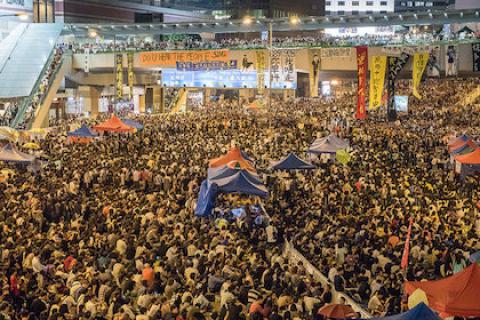Beijing will pay more respect to the "two systems" element of the post-handover formula for Hong Kong while also stressing its "one country" aspect in the wake of the Occupy protests, a source familiar with the central government's thinking says.
Beijing would make "appropriate adjustments" in its policy towards the city, said the mainland official, speaking on condition of anonymity.
Noting that young people formed the backbone of the protests, the official said Beijing wanted to improve Hong Kong youngsters' understanding of the nation's history and development.
Pro-establishment figures have recently called for Chinese history to become a compulsory subject in schools for the first time since 2001.
Chen Zuoer lamented that just 7,000 senior secondary students in Hong Kong now studied Chinese history. Pro-establishment groups have called for Chinese history to be restored as a compulsory subject in secondary school.
"The central government is now attaching more importance to the Hong Kong question and will make appropriate adjustments in its policy towards the city," the official said.
"We need to stress more on 'one country' while paying more respect to the differences between 'two systems'," the official said, of the "one country, two systems" formula, without giving details of how this might be done.
The official said the protests had achieved the students' goal of getting their voices heard by Beijing and they should now end their action as soon as possible.
Although the official said Beijing would not retreat from the strict framework it laid out for the 2017 chief executive election - the spark for the protests that began nearly six weeks ago - the remarks were hailed as refreshing.
Professor Ray Yep Kin-man, of City University's department of public policy, said they contrasted with the tough stance of many national officials in their public remarks.
The official's emphasis on national history chimes with calls by pro-establishment groups, including the Democratic Alliance for the Betterment and Progress of Hong Kong, for Chinese history to be restored as a compulsory subject in secondary school.
In a speech in Hong Kong in June, former deputy director of the Hong Kong and Macau Affairs Office Chen Zuoer lamented that just 7,000 senior secondary students in Hong Kong now studied Chinese history, compared with about 50,000 before the handover.
In 2012, the Hong Kong government shelved plans for compulsory national education in primary and secondary schools in the wake of fierce opposition from critics who saw it as an attempt to brainwash pupils.
Zhang Dinghuai , deputy director of Shenzhen University's Centre for Basic Laws of Hong Kong and Macau, said there was a need to put more stress on the concept of "one country" and that national education was one way of doing so.
"Hong Kong needs to have a unified national education whose contents are accepted by the majority of the people. Unless you have a better understanding of China, the conflicts will not decrease," he said.
"Chinese history is another subject that we need to strengthen. That will help the young people understand more about the country."
Another person familiar with Beijing's thinking said that, 17 years after the handover, many Hong Kong people, particularly youngsters, still did not understand that the foundation of Hong Kong's special status was based on it being part of China.
"Unfortunately, the 'one country' concept in the past has become almost like a dirty word in Hong Kong," the person said.
[Gary Cheung is a reporter of the South China Morning Post and can be reached at gary.cheung@scmp.com. Additional reporting by Chow Chung-yan.]


Spread the word